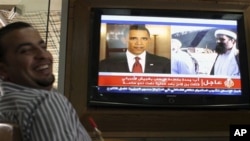In Yemen, where the offshoot al-Qaida in the Arabian Peninsula has taken root, government officials hailed the news as a turning point in the fight against terrorism. So, too, did many ordinary Yemenis.
Sanaa resident Mortada Abed Al Qader said bin Laden was connected with many wrongdoings against Islam, and that his death "was right."
Similar expressions of relief were heard from leaders and citizens around the region.
Turkish President Abdullah Gul said the action shows that terrorists, in the end, are caught whether dead or alive.
In Israel, where the government was a key target of bin Laden’s wrath, leaders expressed joy at the news. Prime Minister Benjamin Netanyahu called it a resounding victory for justice. The Palestinian Islamist group Hamas, however, condemned the killing calling bin Laden an "Arab holy warrior."
Another target, Saudi Arabia, bin Laden’s birthplace and the country that stripped him of citizenship in 1991, has yet to make a formal statement. The Saudi government has spent years fending off terror attacks and trying to rehabilitate followers of the al-Qaida leader.
|
Robert Powell of The Economist Intelligence Unit discusses possible Middle East regional implications of Osama bin Laden’s death in an interview with Susan Yackee:
|
Bin Laden’s legacy in the region has been a handful of small but deadly groups inspired by his terrorist tactics and his fight against all things considered un-Islamic.
A younger generation has taken those ideas and spread them, largely independently, attracting supporters in a diffuse network around the world. One of bin Laden’s followers in Yemen vowed his death only increase devotion to his cause.
Al Qaida supporter Mohammed Alwatari said if bin Laden is really dead, "a thousand Osama bin Ladens will appear - god willing."
On the streets of Cairo, resident Mohamed Rashad said that continuing violence in places like Morocco show that al-Qaida might still be active in the region.
He says al-Qaida is not one person, and although bin Laden is dead, the popularity of his group in several Arab countries continues.
But for everyone who looked to bin Laden for symbolic or spiritual leadership, there were plenty of others horrified by al-Qaida’s definition of infidels. In Iraq, which saw some of the worst sectarian violence carried out under the banner of a local al-Qaida group, there was optimism at news that bin Laden was dead, even as a bomb exploded in a Shi’ite neighborhood of Baghdad shortly hours after the announcement.
Baghdad resident Abdul Zahra Muttar said al-Qaida helped defame the true picture of Islam and has caused great harm to Muslim people both in Iraq and around the world.
But perhaps the most notable regional aspect to bin Laden’s death may be its irrelevance. The al-Qaida chief’s violent and puritanical vision of Islam has been virtually invisible in the wave of popular protests shaking up the Arab world. Said Sadek is a political science professor at the American University in Cairo.
"The current Arab democratic revolution - movements - are mainly led by youngsters, middle-class, urban and they do not want a theocracy," said Sadek. "Their slogans are very clear they want a civilian state, democratic state, accountable state. So bin Laden was not a popular figure or someone with an idea about reform or a state."
Sadek argues that in addition to the revulsion many Muslims felt toward bin Laden’s brand of Islam, the al-Qaida leader caused burdens on a more mundane level.
"He had been responsible for tightening entry visas for many Arab students, Arab investors and average citizens," Sadek said. "So a lot suffered from what he did. I do not think anybody is going to wear a T-shirt carrying the image of bin Laden like we have seen with [Argentinian revolutionary] Che Guevara, for example."
The professor notes that even Egypt’s Muslim Brotherhood, a group which shares common roots in political Islam, has long renounced militant Islam, and has not condemned the killing. Sadek believes that only a very small, marginal group that hates the West and the moderate approach to politics will feel "orphaned" by bin Laden’s death.




